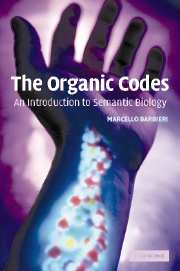Book contents
- Frontmatter
- Contents
- Foreword
- Dedication
- Acknowledgements
- Introduction
- Chapter 1 The microscope and the cell
- Chapter 2 Theories of evolution
- Chapter 3 A new model for biology
- Chapter 4 Organic codes and organic memories
- Chapter 5 The origin of life
- Chapter 6 Prokaryotes and eukaryotes
- Chapter 7 The Cambrian explosion
- Chapter 8 Semantic biology
- Chapter 9 A brief summary
- Appendix: Definitions of life
- Afterword
- References
- Index
Introduction
Published online by Cambridge University Press: 23 November 2009
- Frontmatter
- Contents
- Foreword
- Dedication
- Acknowledgements
- Introduction
- Chapter 1 The microscope and the cell
- Chapter 2 Theories of evolution
- Chapter 3 A new model for biology
- Chapter 4 Organic codes and organic memories
- Chapter 5 The origin of life
- Chapter 6 Prokaryotes and eukaryotes
- Chapter 7 The Cambrian explosion
- Chapter 8 Semantic biology
- Chapter 9 A brief summary
- Appendix: Definitions of life
- Afterword
- References
- Index
Summary
There is a strange paradox in modern biology. On the one hand, new discoveries are made at such a high rate that our science of life appears full of surprises and in a constant state of flux. On the other hand, all new findings are apparently accommodated within a theoretical framework that remains remarkably stable. Present-day biology, in other words, seems to be in that phase of development that Thomas Kuhn referred to as “normal science”, a phase in which an endless stream of novelties is smoothly accounted for by an unchanging paradigm. And this is definitely not for want of alternatives. No efforts have been spared to provide different explanations of life, but none has withstood the test of time. What makes us feel good about our present paradigm (which many call universal Darwinism) is that only the truth – or something very near the truth – can resist so many assaults and outlive generations of critics. In such a situation, I find it almost embarrassing to suggest that our beloved paradigm is not as perfect as we like to think. But this is the message that is coming from nature, and I had better tell you straight away the reasons that lead to this conclusion. The main points are three: the existence of organic codes, a mathematical model of epigenesis and a new theory of the cell.
The organic codes
From time immemorial it has been thought that codes, or conventions, exist only in the mutable world of culture, while nature is governed by immutable laws.
- Type
- Chapter
- Information
- The Organic CodesAn Introduction to Semantic Biology, pp. 1 - 8Publisher: Cambridge University PressPrint publication year: 2002



